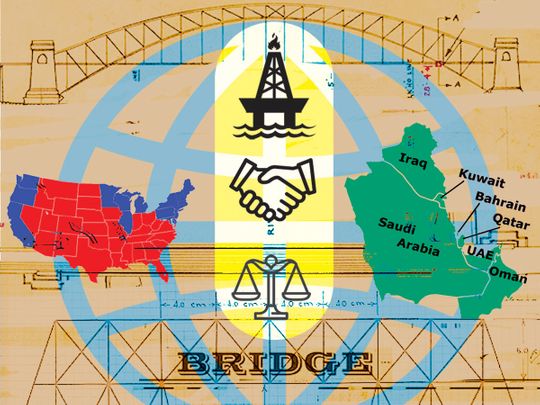
On February 14, 1945, An American military ship witnessed the first summit between the United States and Saudi Arabia. President Franklin J Roosevelt, who had just attended the Yalta Conference of the World War II allied leaders to discuss the future of Europe following the defeat of Nazi Germany, hosted King Abdul Aziz, the founder of Saudi Arabia on board the US destroyer in the Suez Canal.
Although the relationship between the US and the Kingdom goes back years before the historic 1945 summit, historians consider the USS Quincy meeting as the actual beginning of the US-Gulf ties that has stood the test of time on numerous occasions, such as the Arab Israeli wars, the Iraqi invasion of Kuwait and the terrorist attack on New York on September 11.
The historic meeting set the stage for a solid alliance that has weathered so many storms in the past 75 years and contributed to unprecedented stability in the Gulf region as the wider Middle East went through endless conflicts in those long decades.
Today, the US-Gulf relations seem to come under the spotlight just one week before the US presidential elections, with many predicting a Joe Biden win. Many are already lamenting the fortunes of the Gulf post-Donald Trump who took the relationship to higher levels after years of lukewarm ties during the Barack Obama presidency.
Obama’s disengagement strategy
Unlike successive US presidents since the Quincy summit, Obama saw the Gulf with a different eye. He ignored the essentials of the region’s security fundamentals while courting Iran and its allies, particularly the Muslim Brotherhood, as he promoted his infamous idea of a US ‘disengagement’ from the region. His plan to empower the Iranian fundamentalist regime was criticised by most policy experts and US allies in the Gulf. Nevertheless, he went on to sign an Iran nuclear deal that gave Iran access to cash and arms that Tehran happily used to intensify its military interference in Arab countries such as Iraq, Syria, Lebanon and Yemen, posing an existential threat to the very security of the Gulf region. Iran’s leaders boasted that they were now ‘in charge of four Arab capitals’, thanks to a careless Obama strategy.
Donald Trump understood the importance of the US-Gulf ties and thus made it key to his foreign policy agenda in his first term in office.
The US president’s relationship with US traditional allies, in Europe especially, has been tepid at best. He angered European leaders few years ago when he threatened to pull out of Nato unless they started paying their fair share of the military alliance’s cost. He also went against the European desire to keep the Iranian deal intact despite the many flaws in that deal which allowed Iran to continue unchecked its dubious activities. Trump didn’t spare China either. He imposed hefty tariffs to make it more expensive for American businesses operating out of China, which Trump says were costing American workers thousands of jobs.
Trump’s contribution to the region
But with the Gulf, it was a different story. Trump has been keen to nurture the relationship — his first trip abroad as president was to Saudi Arabia in early 2017 when he met other Arab and Muslim leaders. His first major policy decision was to exit the Iran nuclear deal and decided to support the Yemen military campaign of the Arab coalition, led by Saudi Arabia, that is aimed at restoring the Arab country’s legitimate government which was overthrown by Iran-backed Al Houthi rebels in September 2014.
With an increasingly plausible Trump defeat in next week’s elections, some wonder about the future of the US-Gulf ties especially when Biden seems eager to toe the Obama line in foreign policy. Sources say his transition team is basically made up of veterans of the Obama administration. It is quite predictable that Biden, as president, will rejoin the Iran nuclear deal. He has already pledged that. He might even try to reconsider the US support for the Yemen operation.
Nevertheless, those who question the Gulf’s ability to withstand an Obama administration — the sequel, underestimate both the actual strength of the Gulf political order and the core of the US strategic relationship with the six GCC states.
Today, the GCC is a formidable regional power, politically and economically, a major player, if not the only credible player, in the post-Arab Spring order. Washington recognises that very well even if Obama’s naive aids thought at one point that it was possible to engineer a new order that ignores a 75-year-old alliance. The Gulf’s political order is solid as ever due to its intrinsic fundamentals and its security is no longer in a fragile state or totally dependent on the US aid as some in Washington would like to believe.
Reciprocal relationship
Secondly, the US Middle East policy, a major element in the foreign policy agenda of any administration, has become increasingly dependent on the help of its GCC allies. The US can no longer achieve any objective in this region without the support of the GCC. The strategic ties between the US and the Gulf therefore have developed a new dimension — it has become more of a reciprocal relationship.
It is true that the US-Gulf relations are traditionally stronger under a Republican administration. But the US today needs the Gulf more than ever — no matter who is in charge of the White House. Just remember, Roosevelt was a Democrat.







